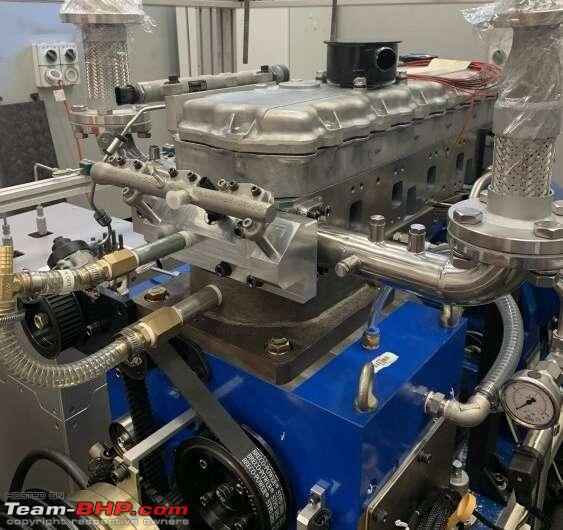| Engineers retrofit Diesel Engine to use hydrogen as fuel | Develop dual-fuel system
Engineers at University of New South Wales (UNSW) have developed a dual-fuel injection system which will run on 90 percent hydrogen as fuel  Quote:
Engineers at University of New South Wales (UNSW) have found success in retrofitting a diesel powertrain to use hydrogen as a fuel in order to reduce carbon emissions.
It might sound a bit unrealistic but the team’s hard work of 18 months has paid off in style. The engineering team took one and a half years to develop a dual-fuel injection system which takes 90 percent hydrogen as a fuel. Elated by this success, the team further stated that future retrofits will not take as much time and as a matter of fact, they could be done in a very few months.
The dual-fuel injection system developed by engineers retains the original diesel injection into the engine, albeit with the addition of a hydrogen fuel injection directly to the cylinder. The team also found a way to counter the high nitrogen oxide (NOx) emissions which happen with hydrogen engines. The researchers didn’t put hydrogen into the engine and mix it up, instead an approach of stratified addition, i.e. more hydrogen in certain parts and less in certain parts, was followed so that NOx emissions are omitted. Eventually, the NOx emissions were reduced upto a significant stage in the dual-fuel engine.
A special mention goes to the dual fuel system’s non-dependency on high-purity hydrogen to use as fuel unlike the traditional hydrogen fuel cell systems. As known, the high-purity hydrogen costs a bomb and hence the new system developed by the engineers at UNSW can be used by people at lower costs. Moreover, the dual-fuel injection system is highly energy efficient (by approx 26 percent) as compared to the diesel engines.
The team is planning to commercialize this technology within the next couple of years and deploy it first in industrial locations such as mining sites where piped hydrogen lines are already in existence. Post this, it could look forward making the technology more mass-scale.
It is crystal clear that a complete overhaul of heavy vehicles like trucks and buses to zero-emission will take decades. However, if the technique used by the engineers at University of New South Wales is taken into consideration, it could be carried out rather quickly as retrofitting existing diesel engines would take very less time. Furthermore, the production of hydrogen using renewable energy sources is way more environment-friendly as compared to burning of diesel.
|
This is promising news indeed. And it holds hope for the millions of diesel vehicles that are plying on the roads in the country today. Given the ambitious programme of the Indian Government to become a significant player in production of green hydrogen, this development certainly holds a lot of promise. The only challenges I feel will be - Commercialisation of this technology.
- Proof testing and scaling up the adoption of this technology for retrofitting of existing diesel vehicles.
- Production of green hydrogen in large quantities.
- Putting into place a robust and widespread hydrogen distribution and sale network akin to that of petroleum products.
These are significant challenges by themselves and will need political will and policy change at the apex level. All the same, this is encouraging news indeed and if implemented properly, may well prove to be a revolutionary step in reducing emissions in the road transport sector thus combating climate change while also reducing our dependence on fossil fuels for energy and transport. Who knows, if deployed innovatively, this revolutionary tech may even find further utility in the realm of electricity generation, shipping, railways, aviation and other industries that need a steady and regular source of energy. Though it will take a lot to fight and reverse the ill effects of climate change, this may indeed prove to be a positive and significant step in humankind's struggle to combat this scourge that alas is of our own making.
Cheers ! Source Source
Last edited by Ironhide : 13th October 2022 at 23:19.
Reason: Adding links to source and articles
| 

 (4)
Thanks
(4)
Thanks

 (1)
Thanks
(1)
Thanks

 (2)
Thanks
(2)
Thanks





